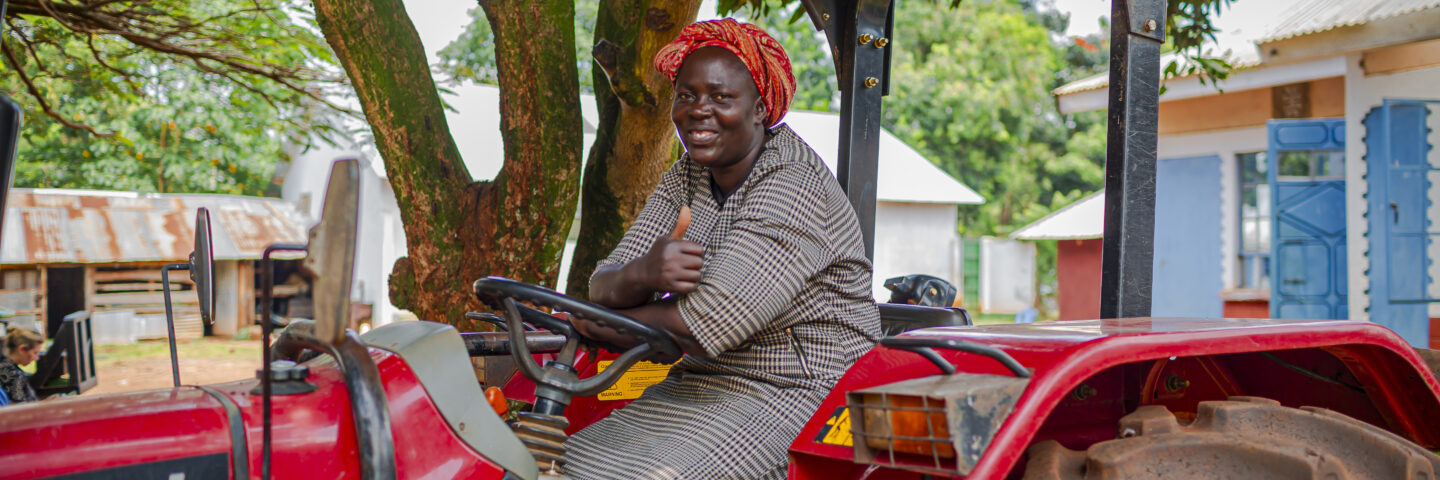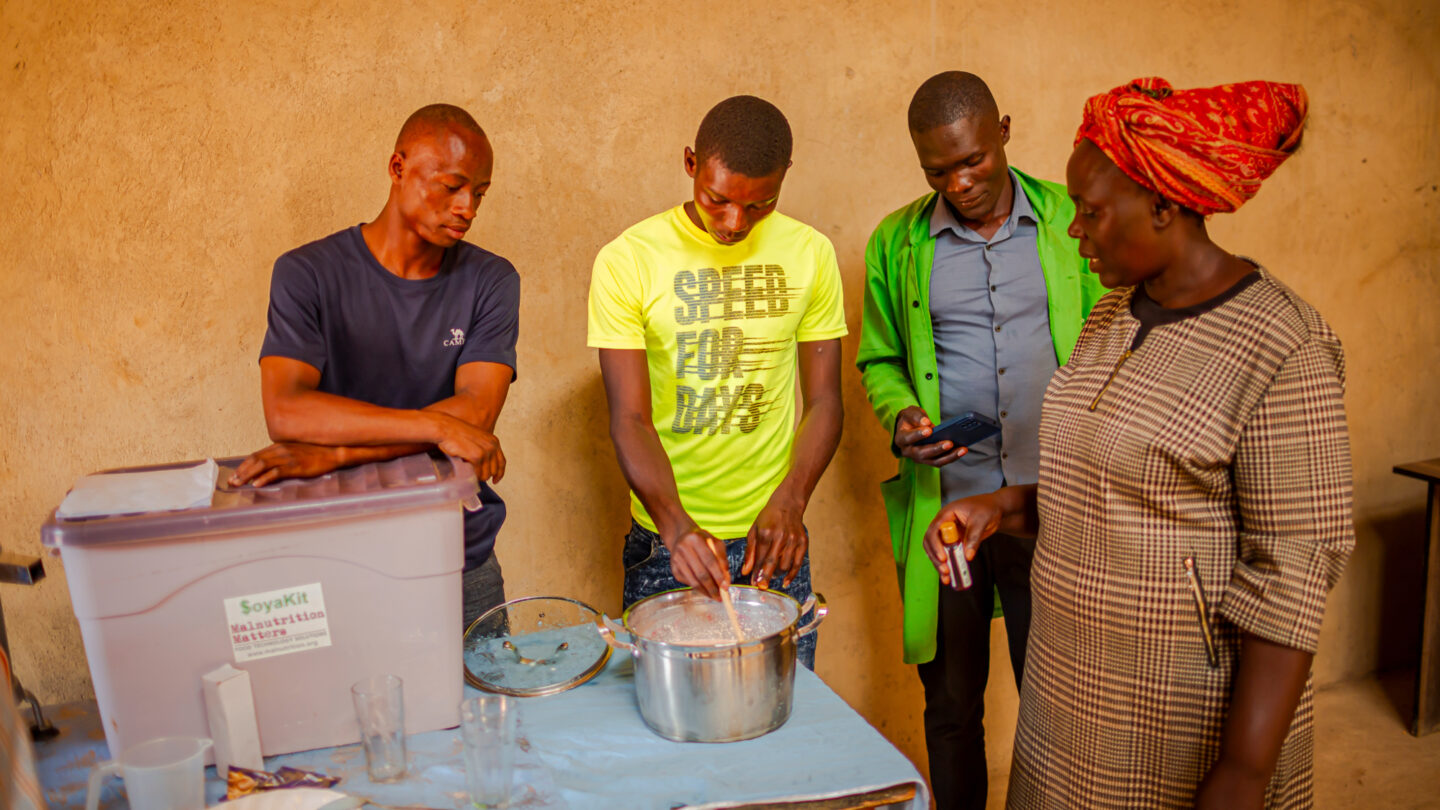
In Kenya, A Rural Entrepreneur Helps Young People Find Work
Farming and Entrepreneurship transformed Rosaline’s life, so now she’s helping young men and women from her community do the same.
Every year during the post-harvest season, more than 50 young people arrive at Rosaline Siama’s home in rural Kenya, looking for work. “I cannot turn them back, so we hire them all and distribute the work between them,” says Siama.
From her homestead in Namikhoye village, in the East African country’s west, Siama runs the Matayos Farmer Service Center, an agricultural outputs facility focusing on post harvest services and soy production, employing upwards of 70 young farmers, university students, and people from across her community throughout the year.
“Farming is not just about survival—it’s a business. With proper training, anyone can turn it into a source of income,” she adds. As a female entrepreneur and role model, Siama is proud of her business providing regular employment in this traditional low-income community.

Rosaline holds soybeans—a value-added crop introduced through training and support from iDE Kenya as part of the She Feeds Africa program.
Photo by George Opejo for iDE.
Entrepreneurship Provides a Pathway for Unemployed Youth
In Kenya, young people under 34 make up 35% of the population and account for 67% of all unemployed. According to the Kenyan Federation of Young Employers, by 2045, this number is projected to double, illustrating the wider challenge of rapid population growth and youth unemployment facing the African continent. Some 70% of Kenya’s population live in poor rural communities, where employment opportunities are few.
However, rural entrepreneurs like Siama offer young people a chance at regular work, enabling them to learn new skills and build a vocation.
“Most of the youth here are unemployed,” says Siama. “If we can plant crops like soybeans in abundance and involve the youth, we can tackle unemployment in the village.”
Siama began her business selling fertilizer from a mud hut on her property in 2021. After 5 years of hard work, her farm grew to 25 acres with 70 rotating staff and began harvesting maize, sorghum, and two climate-resilient soy strains

Rosaline Siama, an entrepreneur from Busia, employs 70 people, including local youth, on her 25-acre farm where she produces soy yogurt alongside crops like maize and sorghum. Charles Andera, a thresher operator who supports farmers during harvest, employs 10 young workers and collaborates with Rosaline. Pictured, their employees work on yogurt production techniques. Photo by George Opejo for iDE, 2024
Her focus on employing young people began after she received support from iDE as a participant in the Zinpro and Anderson Foundation-funded “She Feeds Africa”project in 2023. The multiyear project is designed to power Kenyan women in agriculture by providing mechanization tools, business support, and access to financing.
As part of the project, IDE helped Siama apply for a loan for a threshing machine—farm equipment designed to separate grain during harvest season—and her business quickly grew, which meant she needed extra hands to run her business.
During a visit to Kenya’s capital, Nairobi, she also attended an iDE workshop on digital marketing, including social media training for WhatsApp and Facebook, which helped her expand her brand and attract more threshing customers. “After the training, I needed help. I knew young people needed work in my village so I hired three young people to be trained as operators for the threshing machine and sent them to farms to start processing sorghum.”
Douglas Ogolla, 28, was one of the first trained and hired by Siama as a threshing machine operator. Like many young Kenyans, he wanted to get away from village life and moved to Nairobi to find work. But after six months without success, he returned to his village and took up farming.

Rosaline's homestead has grown from a small mud hut to a large facility and storage space. Charles is captured in the photo. Photo by George Opejo for iDE, 2024
“Agriculture is good—when you get deep into farming, especially growing soya, maize, or sorghum, you will definitely make money, " says Douglas. "To the youth facing unemployment, I highly advise planting at least an acre of soy, selling it, and taking small steps toward greater success.”
Promoting youth employment has emerged as an added benefit in the ‘She Feeds Africa’ project, which has been running for five years. Under the project, rural Kenyans like Siama, are helping their communities as they learn new skills and diversify their crops.
The project has processed 2.9 million kg of grain, increased revenue and market access for female farmers working with iDE, improved food security, and strengthened women's roles in the agricultural sector. The success of project participants like Siama is helping shape the future of agriculture in Kenya by tackling postharvest losses, fostering value addition, and addressing the unique challenges faced by women.

Promoting youth employment has emerged as an added benefit in the ‘She Feeds Africa’ project, which has been running for five years. Here Rosaline is pictured at home where she also farms. Photo by George Opejo for iDE, 2024
John helped Bernard build his agribusiness from scratch, and now he's doing the same for other young people
In Malava village, in rural Kenya, Bernard Duma, 32, noticed that many new farmers were struggling with poultry production. Skilled in the industry, he saw and opportunity and decided to offer training on poultry health, disease management, and feed formation techniques.
With support from iDE, which provided Duma with technical and digital upskilling, his business, Bernoch Enterprises, rapidly expanded.
“Farmers had knowledge, yes, but we need to pump in more of the knowledge so that they can utilize it for better production and solving challenges in the field,” he explained.
As people in his community struggle to find work and make a living, Duma believes agricultural entrepreneurship offers a way out of poverty. “Agriculture is the best way to go because you have the money, and there's no one bossing you around,” he said.
With support from iDE, Duma is now exploring value-added practices, including a more nutritious chicken feed formula made from maize, sunflower seed, soymeal, seed cake, and fish meal. With plans to sell it commercially, using the digital marketing skills he learned through iDE, with over 60% of his other business coming from WhatsApp and Facebook.

iDE helped Duma with technical and digital upskilling which is helping his business, Bernoch Enterprises, rapidly expand. Photo by George Opejo for iDE, 2024
Kenya's agri-food sector is vital to the economy, employing 60% of the workforce and contributing over half of the GDP. However, as the population grows rapidly, only 10% of young people pursue careers in farming or agribusiness, and those who do often struggle to access the skills needed to scale their businesses or connect to the market.
Like Duma, his friend and colleague John Ekeya, 36, runs a mobile agro-shop business in the next village and is an advocate for skills training and supporting unemployed young people in his village. Through iDE, he acquired a maize sheller early in his business using a savings plan, along with technical training that helped him begin offering services to farmers during the harvest season.
“The option iDE came with—where you pay half, and they give you the machine to start operations—was a game changer. My organization agreed to support me in paying half of the capital, so from there, I had the interest,” he explained

John runs a mobile agro-shop business in the next village and is an advocate for skills training and supporting unemployed young people in his village. He recently opened a small store for his wife, Real, selling second hand clothing and home goods. Photo by George Opejo for iDE, 2024
Read More
